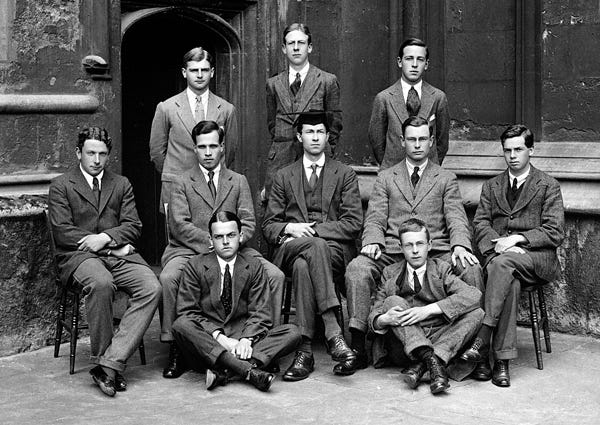C S Lewis on Faith and Flourishing - part II
Why Lewis attended (so much) to human flourishing – in its physical and social, not just its spiritual dimensions

I’ve said that Lewis thought a lot about flourishing. The theme was in fact never far from his mind or pen. Let’s take a moment to consider why that might be so – and why also, as a Christian writing (often) to explicate and portray the ultimate Christian hope that transcends this world – he attended so much to matters related to the material and social, not just the “spiritual,” dimensions of flourishing.
To begin to address this question, I’d like to start with his life story. We need to start there with Lewis for the same reason that we start there with Augustine. And this is because Lewis engaged in philosophical and theological inquiry about flourishing for the same reasons Augustine did: to find out how he himself should live. So his personal biography – how he had in fact lived up until his conversion – and after – has everything to do with his very great and constant engagement with questions of flourishing. And a brief tour of his story will quickly surface for us something of the shape that that inquiry took for him—that is, the kinds of philosophical and theological questions he was moved or driven to ask, and the conclusions to which he came.
“The great continent sank”
First chronologically, and perhaps also first in importance, there was the fact that from his early childhood, Lewis experienced tremendous interruptions of flourishing, a sort of precariousness of all happiness. Pick anything you like here: his life with a mercurial, erratic father; his early education at a boarding school under a clinically insane headmaster; his extreme manual clumsiness that thwarted almost all that he tried to make or do in the world of material stuff; his ingrained belief, caught early from his father (and despite the fact that they lived quite comfortably), that he was doomed to live perpetually on the verge of poverty, no matter how he worked; and there’s more.
The hinge event, however, was the death of his mother before his tenth birthday. In that moment, he remembered, “the great continent sank” – leaving him struggling with long-term disorientation. Few share the intensity of a search for flourishing and personal identity that begins with the childhood loss of a parent. No wonder he and Tolkien came to know and love each other so well – as that great Christian author had also experienced the early loss of parents.
Lewis himself pointed to all of these factors to explain the quote “deeply ingrained pessimism,” which led him, even as a child, to as he said, “[form] the opinion that the universe was, in the main, a rather regrettable institution.” It was perhaps the loss of his mother, though, that most fed his lifelong, pervasive sense of the fragility of human flourishing, and his tendency to argue that real happiness always emerges “in the moment”—as a present delight—not out of some obsession with future goods—and I’ll come back to that theme in a moment.
“Red meat and strong beer” – Lewis discovers philosophy
The second biographical moment in Lewis’s lifelong inquiry into flourishing was his entry, as a teenager, into a time of intensive tutoring in philosophy, and particularly in classical philosophy. In Aristotle and the rest, he found a language for that inquiry. And he was electrified. This study, as rigorous as it often was under his relentlessly rational tutor, was for Lewis “red meat and strong beer.” There’s little doubt that it made him what he would remain for the rest of his life – at heart a philosopher (though never a professional one), who would always probe the meaning, purpose, and happiness of human life – starting with his own. He also, by the way, one of his Oxford entrance examiners said, came out of that study as perhaps “the best prepared boy in England” in the classics, and as one who was inclined for the rest of his life to look to philosophy and literature for – as Guy Noir always said – the answers to life’s persistent questions.
“De Futilitate”
Thirdly, Lewis’s young adult years coincided with the First World War – in which he served and was injured – and the years of his maturing thought and theological writings were interrupted by, and one could argue, haunted by the Second World War. Culturally, these wars effectively destroyed an earlier optimistic consensus that expected a universal and inevitable rise of flourishing – through “progress” – and left in its place the anxieties of existentialism and the pessimism and historical realism of neo-Orthodox theology. Thus in those formative years of Lewis’s adulthood, questions related to human flourishing became fraught.
We hear this influence, for instance, in a talk Lewis gave in 1942, just before the end of that second war, with the lively title “De Futilitate” – that is, “On Futility.” Here Lewis assessed the Zeitgeist in these words:
“The eschatological hopes which supported our more remote, and Christian ancestors, and the secular hopes which supported the Revolutionaries or even the Liberals of the last century, have both rather faded out. There is a certain vacuity left: a widespread question as to what all this hustling and crowded life is about, or whether indeed it is about anything.”[1]
This, of course, is just the question that those concerned with human flourishing have always tried to address.
[1] p. 80 in this edition of Christian Reflections, ed. Walter Hooper: Great Britain: Fount, 1981.



